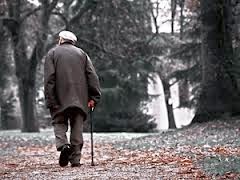“Rose said I had to come. She said she can’t stand it anymore that I don’t talk. I’m happy with her. I don’t know what more she wants. We’ve been going out for over five years. I’m too old for this. Who ever heard of an 89 year old man seeing a … you’re a psychologist, right?”
“No one is too old for therapy,” I say nodding, “But it doesn’t sound as though you want to be here.”
“Right,” he says. “I’m not going to change now. I was married for over fifty years and my wife complained of the same thing. I didn’t change then and I’m not going to change now.”
“You sound almost proud of your reluctance to change,” I offer tentatively.
“No, just resigned. What’s the expression, ‘You can’t teach an old dog new tricks.’ But I told Rose I’d come, so here I am.”
“Can you tell me about yourself, about your background, your childhood?”
Another sigh. “My mother died when I was three. My father couldn’t take care of me – or didn’t want to – so I spent my childhood in an orphanage, two orphanages actually. The first one was in Brooklyn. It was boys and girls. Then when I was 10 they sent me to upstate New York, Syracuse, where it was just boys. It was run by rabbis, very strict. But it was okay. We got fed. And then when I got to be 18 I had to leave, so I joined the army. That was OK too. It was good actually. I grew up and learned to be responsible and even got to see some of the world. And they taught me to be a mechanic so I got to make a decent living when I got out. All in all it was a pretty good life. I have no complaints. The bad parts, I just put them away. No point in dwelling on the negative.”
As Mr. Stein relates his story, deadpan with no affect, I feel an increasing heaviness in my body and an enveloping cloud of sadness overtaking me. “You certainly had a very sad, deprived childhood,” I say gingerly.
“It wasn’t so bad. As I said, they fed me, they didn’t abuse me and in Syracuse we had lots of empty space to run around. Besides, I did all right. Took care of my wife and three kids. No complaints. I just put the bad stuff away.”
“Did you see your father over the years?” I ask, aware that I am reluctant to probe too deeply into this man’s psyche. Over his long life, he’s built up a stalwart defense that has worked for him, protecting himself from the pain of his early life.
“He’d come and visit sometimes. But he could never be counted on. He wasn’t reliable. I don’t even know how many wives he had. And he stole money from me. While I was in the army I sent him money to hold for me and he gambled it away.”
“That must have made you very angry.”
“I guess. At the time. But I just started working again and built up my little nest egg. As I said, no point dwelling on the negative.”
“And your mother? Do you remember her?”
“Nah. I was only two or three when she died. I didn’t know anything more than the orphanage. When that’s all you know, it’s okay. As I said, my life turned out pretty good.”
What next, I ask myself. If this man was 30 or even 20 years younger, I’d be far more eager to explore his defenses, to try and get to the pain that must reside underneath. Is my reluctance to attempt to plumb his depths ageism? Perhaps. But he has the same reluctance. Except he’s here.
“Mr. Stein, you say that Rose insisted that you come. What would happen if you didn’t? Why did you agree? Is there anything you’d like to get out of coming here?”
“She’s a good person. I don’t think she’d stop seeing me, but maybe she would. I don’t think so, though. But I’d like to make her happy. Maybe you could help me work on things to talk to her about.”
“How about what you were telling me about today? Your background. Your experiences.”
“You think she’d be interested in that old stuff?”
“Yes, I suspect she would. So maybe that’s one thing we could do. You could tell me things about yourself, as kind of practice for telling Rose.”
“I guess.”
We are both still reluctant participants, perhaps fearful of exposing too much pain on the one hand, or dealing with the deadness of meaningless conversation on the other.



6 comments:
PS: maybe therapeutic conversation will be the opposite of dead and meaningless. Maybe only another person's interest will be able to ignite his interest in himself?
I really like this post, for several reasons. One, it gives me hope that if I make to 89 I still might be able to make my life better. Two, your description of Marty's early life was moving. And three, the photos you chose perfectly illustrate your words. Thank you.
Thank you! Glad you appreciated the post and that it gave you hope.
I definitely agree that a therapeutic interaction is the opposite of a dead and meaningless conversation.
And, yes, hopefully, another person's interest would ignite a greater in himself. The problem is to accomplish that without exposing more of his pain and vulnerability than he is capable of dealing with.
Enjoyed reading your blog. I use the same methods in relating to a friend whom I have been visiting and relating to for over eight years. She is 96 years old. Even though she considers our meetings therapeutic, our connection is mostly at another level- true spirituality.
Thanks for your feedback.
Glad you are able to connect so deeply with your friend.
Post a Comment